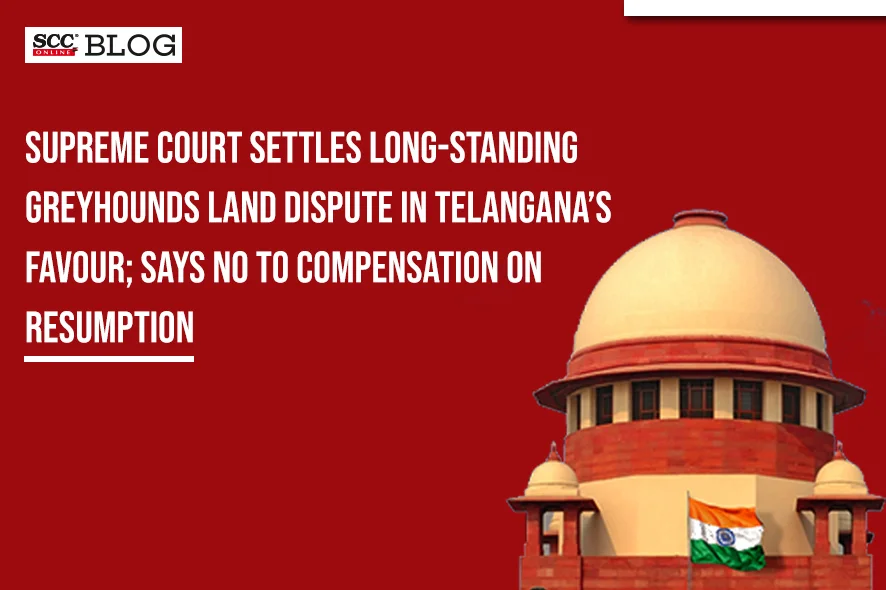Supreme Court: Giving a “final quietus” to a land dispute dating back to 1994, the bench of Surya Kant and JK Maheshwari has invoked its power under Article 142 of the Constitution to do complete justice to the parties and has declared a tract of land measuring around 142 Acres in its entirety to be vested in the Telangana Government in favour of the Greyhound Commando Force.
The Court further directed that,
“No Civil Court or High Court shall entertain any claim whatsoever on behalf of any Assignee, their legal representative, GPA holder or any other claimant under any Agreement to sell or other instruments, claiming direct or indirect interests in the Subject Land”
Background of the legal tussle
In the case at hand, the Subject land was assigned to landless Scheduled Caste/Scheduled Tribe persons (the Assignees) for the purpose of cultivation in 1960s. When, with the passage of time, the city of Hyderabad flourished on account of rapid urbanisation and swift economic development, making land a scarce and valuable resource, all the Assignees, in 1991, executed a general power of attorney (GPA) in favour of a third party, who then sold a part of the Subject Land to private individuals between the period of January 1992 to October 1992, after dividing the Subject Land into smaller plots akin to a residential colony. This was evident from the fact that each sale deed was allotted a unique plot number along with roads earmarked in the site plans attached thereto.
In 1993, when the Police Department sent a requisition for land in Manchirevula village to set up operational headquarters and training centres for its special forces, now known as ‘Greyhounds Commando Force’, the revenue authorities noticed the legal infirmities associated with the Subject Land, starting the saga of present legal tussle between the parties in 1994 as the Andhra Pradesh Assigned Lands (Prohibition of Transfers) Act, 1977 prohibited transfer of land assigned to landless poor by the Government.
Supreme Court’s Analysis
Transfer by Assignees in violation of Section 3 of the 1977 Act
The Supreme Court held that the ‘transfer’ through the GPA by the Assignees authorizing the attorney holder to sell or transfer the subject Property without any restriction fell within the ambit of the term ‘transfer’, especially in view of the objective of the 1977 Act, which was manifestly intended to save the landless poor persons from the clutches of the rich and the resourceful, who deprived them of the precious title assigned to them by the Government for their occupation and the source of livelihood. This, hence, resulted in violation of Section 3 of the 1977 Act.
Re-assignment of land to legal heirs of asignees
The Appellants contented that the Subject Land should be re-assigned to them as they are the legal heirs of the Assignees, as Section 4 of the 1977 Act as it stood on the date when the resumption orders were passed, i.e. 27.01.2007, only stipulated that a breach under Section 3 would result in possession of the land being taken over from the third party to whom the land was transferred and restored back to the original assignees.
The Court, however, noticed that the 2007 Amendment was retrospectively applicable and empowered the Government to notify certain areas where the Government can resume the assigned lands and utilize them for public purposes such as Weaker Sections Housing, Public Utilities, Infrastructure Development or for any other public purpose in such areas as may be notified by it. This Amendment was brought in keeping in mind that most of the assigned lands have been alienated by the original assignees and the lands were converted to non-agricultural use.
The Court, hence, found the resumption of land by the Government absolutely valid.
Compensation for Resumption
The Court held that the Appellants were not entitled to any compensation under the existing constitutional framework as there was a significant difference between the terms ‘acquisition’ and ‘resumption’ in the context of property laws.
“Acquisition denotes a positive act on behalf of the State to deprive an individual’s enjoyment of a pre-existing right in a property in furtherance of its policy whereas resumption denotes a punitive action by the State to take back the right or an interest in a property which was granted by it in the first place.”
The Court, hence, held that the term ‘resumption’ must not therefore be conflated with the term ‘acquisition’ as employed within the meaning of Article 300-A of the Constitution so as to create a right to compensation.
The Court also took note of the fact that serious allegations prevail against the Appellants for being involved with the land mafia to usurp the Subject Land for private interests which was the precise reason for the Government to introduce legislation in the nature of the 1977 Act.
[Yadaiah v. State of Telangana, 2023 SCC OnLine SC 897, decided on 01.08.2023]
Judgment authored by Justice Surya Kant
Advocates who appeared in this case :
For Petitioner(s): Mr. Krishna Dev Jagarlamudi, AOR; Ms. Inderdeep Kaur Raina, Adv.; Mr. Aaditya Mishra, Adv.; Mr. Sumanth Nookala, AOR; Mr. Divyesh Pratap Singh, AOR; Ms. Shivangi Singh, Adv.; Mr. Vikram Pratap Singh, Adv.; Mr. Suraj Prakash Singh, Adv.; Ms. Ishita Bedi, Adv.; Ms. Ranjana Singh, Adv.; Ms. Shivani Singh, Adv.; Mr. Ravi Shankar, AOR; Mr. G. N. Reddy, AOR; Mr. Sughosh Subramanyam, Adv.; Mr. Vedurumudi Vishnoo C. Kashyap, Adv.;
For Respondent(s): Mr. Rajiv Kumar Choudhry, AOR; Mr. Sriharsha Peechara, Adv.; Mr. Rajiv Kumar Choudhary, Adv.; Mr. Duvvuri Subrahmanya Bhanu, Adv.; Ms. Pallavi, Adv.; Ms. Kriti Sinha, Adv.; M/s. Venkat Palwai Law Associates, AOR.







